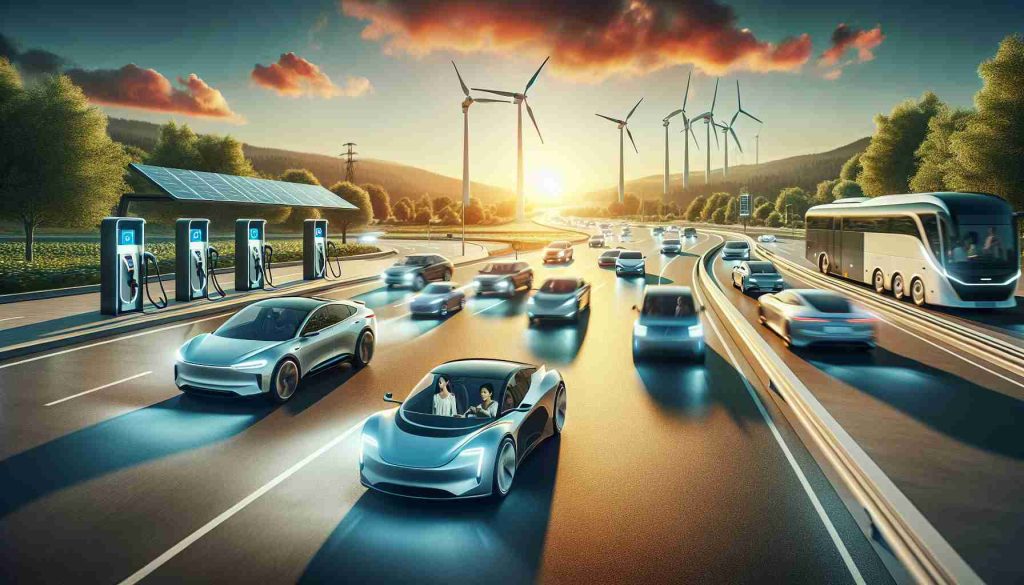Electric Vehicles Spearheading a Sustainable Automotive Future

Summary: The automotive sector is undergoing a revolutionary shift towards electric vehicles (EVs), driven by technological advancements and a worldwide resolve to reduce carbon emissions. While the expansion of the EV market signifies societal commitment to a sustainable future, various challenges such as battery maintenance, insurance cost-effectiveness, and ethical raw material procurement persist. Insights from Alejandra Cabrera of Gasmet Technologies at ChargeExpo 2024 highlight both the progress and the hurdles of the EV evolution.
The automotive landscape is in the midst of a seismic change as electric vehicles (EVs) lead the charge towards an environmentally conscious mode of transport. These vehicles, powered by innovative battery technologies, promise to redefine our roads and contribute to a reduction in global carbon footprints.
The Evolution of Electric Mobility
EVs are breaking barriers, becoming a more common sight on roadways as consumer interest peaks alongside a surge in sustainable energy solutions. The electrification of vehicles is not merely a trend but a significant transition supported by the progressive development of batteries. These advancements have extended driving ranges and decreased costs, making EVs an increasingly viable option.
Championed by comprehensive market research, the EV sector is predicted to flourish in the near future. The success of electric mobility, however, is dependant on navigating through several challenges including ethical battery production, and accessible repair and insurance practices.
During a recent dialogue at ChargeExpo 2024, Alejandra Cabrera, a seasoned product engineer with Gasmet Technologies, shed light on this transformative era in the automotive industry. With expertise in gas analysis and battery safety, she underscored the importance of diversified battery chemistries and the contribution they make towards both mobile and stationary energy storage solutions.
Cabrera also recognized the substantial role policies play in promoting the adoption of EVs. Nevertheless, she drew attention to the need for industry-wide solutions to obstacles posed by battery repairs, insurance affordability, and sustainable raw material procurement.
The EV narrative is complex, shaped by technological, policy, and industry dynamics. Through the lens of professionals like Cabrera, it’s clear that overcoming the industry’s current obstacles is as critical as the technological achievements in securing the success of electric vehicles.
To further understand the evolving dynamics of the electric vehicle market, the International Energy Agency (IEA) and the Electric Vehicle Council are valuable resources that offer detailed insights into the sector’s trajectory. The insights shared by experts such as Cabrera provide a roadmap for realizing the full potential of electric mobility in the face of climate change.
Prospects and Challenges in the Electric Vehicle Industry
As electric vehicles (EVs) continue to gain traction, the automotive industry is experiencing a pivotal transformation. This move towards electric mobility is in line with global efforts to combat climate change by reducing dependency on fossil fuels and lowering emissions. It’s a movement that aligns with increasing environmental awareness among consumers and stringent emissions regulations by governments worldwide.
Market Forecast for Electric Vehicles
According to recent studies, the demand for electric vehicles is projected to grow exponentially. Analysts expect that the market share of EVs will significantly increase in the next decade, with some forecasts suggesting that EV sales could account for more than half of the global automobile sales by 2040. This predicted growth is buoyed by continuous improvements in battery technology, reductions in production costs, increased range, and a growing infrastructure for charging stations.
Key Issues Faced by the EV Industry
<G. However, along with the optimism come critical challenges that require resolution. Battery maintenance remains one of the top concerns, as the lifespan and efficiency of batteries determine the usability and total cost of ownership of EVs. In addition, the ethics of raw material procurement have come under scrutiny, as some of the necessary components, like cobalt and lithium, raise questions regarding environmental impact and labor conditions in mining operations.
The cost-effectiveness of insurance for electric vehicles is another factor that could influence consumer adoption. Typically, insurance premiums for EVs have been higher when compared to traditional combustion engine vehicles, reflecting the current market’s perception of higher risks and repair costs associated with electric vehicles.
Looking Ahead: The Road to EV Adoption
Despite these hurdles, there is a palpable sense of momentum in the industry. Technological advancements in battery efficiency, along with increased investments from governments and private sectors in EV infrastructure, signal a bright future for electric mobility.
Furthermore, automakers are constantly innovating to address these challenges. Progress is seen in the development of more sustainable battery materials and recycling methods to ensure that the environmental footprint of electric vehicles is minimized throughout their lifecycle.
For those who wish to stay updated on the latest trends in the EV industry or seek an in-depth analysis of market forecasts, reputable sources such as the International Energy Agency (IEA) website at IEA or the Electric Vehicle Council at Electric Vehicle Council offer a wealth of information.
In conclusion, the electric vehicle industry stands at the frontier of an automotive revolution. The insights provided by experts like Alejandra Cabrera of Gasmet Technologies, coupled with supportive policies and consumer acceptance, will be critical in navigating through the prevalent issues. Realizing the full potential of EVs will not only reshape the automotive market but also contribute significantly to a cleaner, more sustainable future for our planet.
[embedded content]

Michał Rogucki is a pioneering figure in the field of renewable energy, particularly known for his work on solar power innovations. His research and development efforts have significantly advanced solar panel efficiency and sustainability. Rogucki’s commitment to green energy solutions is also evident in his advocacy for integrating renewable sources into national power grids. His groundbreaking work not only contributes to the scientific community but also plays a crucial role in promoting environmental sustainability and energy independence. Rogucki’s influence extends beyond academia, impacting industry practices and public policy regarding renewable energy.

